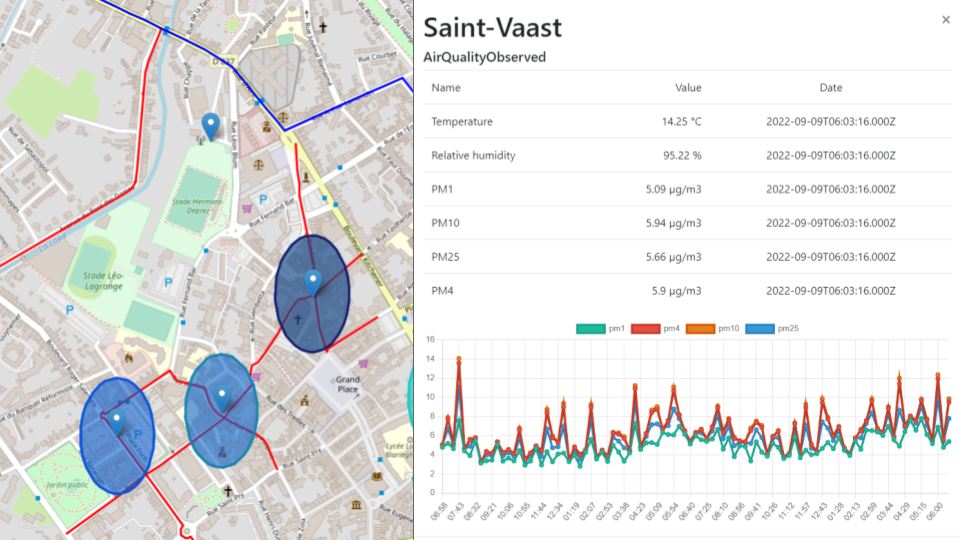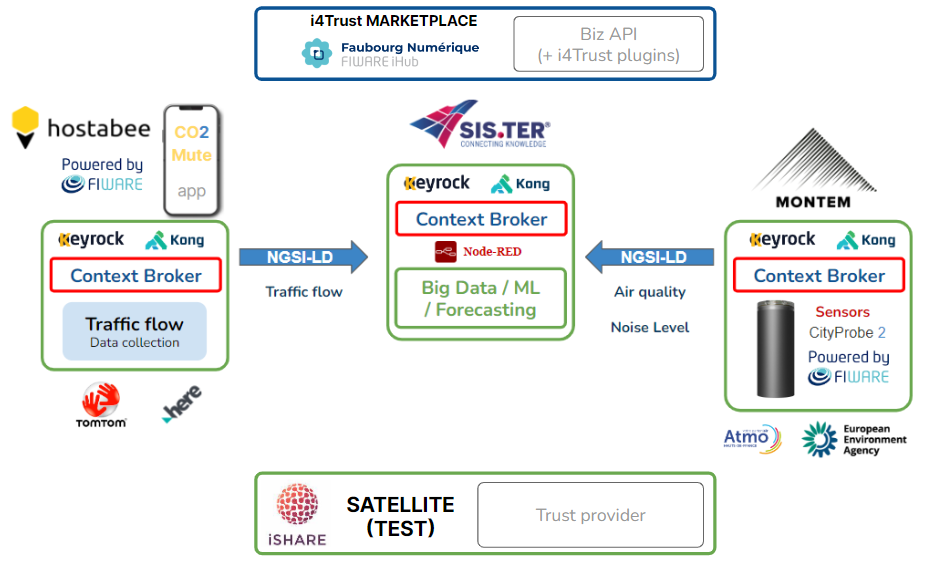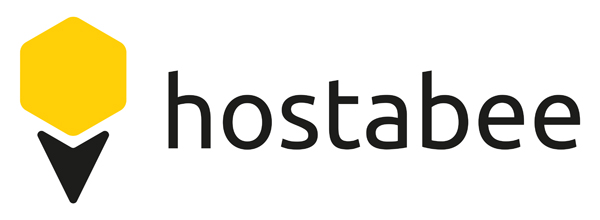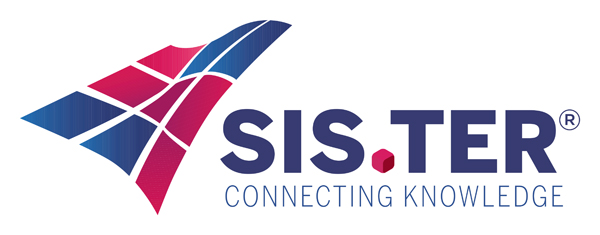Background
Since September 2020, FIWARE Foundation has been leading the successful i4Trust project around Data Spaces, which has been receiving funding by the European Commission under the Grant Agreement of 951975. Thanks to the extraordinary collaboration of partners such as iShare and FundingBox, 32 selected solutions on Data Spaces have been awarded and funded. With the first impacting results available, FIWARE has decided to publish a fine selection of Impact Stories showcasing FIWARE-based solutions created by an awarded and funded consortium of DIHs and SMEs. The CO2-Mute project aims to support local governments in their efforts to deploy policies for sustainable mobility and urban green infrastructure as part of their local environmental and digital transition strategies leveraging the power of the Data Spaces.
Challenge & Context
The European Union has set ambitious targets to reduce CO2 emissions by 2030 in order to mitigate climate change and pollution levels and to improve the quality of life for citizens. While member states are responsible for determining strategies and targets appropriate to their specific circumstances, it is the responsibility of individual regions and cities to put these policies into practice and adapt them to the local context.
The transportation sector is one of the main contributors to negative environmental impacts due to its role in air pollution, greenhouse gases and CO2 emissions. To reduce traffic congestion and the related environmental impact, local governments have been investing in Mobility-as-a-Service strategies and infrastructures to encourage the use of alternate means of transportation such as public transport and cycling. However, changing the habits of citizens remains a big challenge.
On the other hand, urban green infrastructure such as parks, gardens, urban forests, and vertical gardens, contribute directly to air quality and carbon neutrality through the removal of air pollutants, carbon storage, and carbon sequestration. They also indirectly contribute to other policy targets such as health, well-being, climate change adaptation, biodiversity, urban regeneration, stormwater management and social equality. These solutions, known as Nature-Based Solutions (NBS), can contribute to the overall effort to reduce emissions and improve the environment.
The CO2-Mute project aims to support local governments in their efforts to deploy policies for sustainable mobility and urban green infrastructure as part of their local environmental and digital transition strategies. The project’s focus is to help local authorities understand their situation and define policies for addressing mobility and green challenges. Additionally, the project will prepare citizens for their participation in the implementation of these policies to change mobility habits.
CO2-Mute would like to gamify alternative mobility usage and enhance the role of green spaces in pollution mitigation by proposing collective and individual achievements for commuters and workers. These achievements will be used to evaluate impacts on costs, traffic and the environment (air and noise pollution).
Solution
CO2-Mute uses various data sources, such as traffic data from Tom-Tom and HERE APIs, data from five air quality and noise sensors provided by MONTEM A/S, and data obtained from local weather stations about the environmental status and time range. This data will be correlated and a custom algorithm will be developed to calculate the estimated impact of traffic reduction on air pollutant concentrations.
The results of the analysis will be made available to the concerned local government and ecosystem, and will be integrated into urban planning decision processes with a focus on green spaces. When needed, the data will be anonymized to comply with the GDPR.
At each stage of the CO2-Mute value proposition, seamless access to heterogeneous data from various sources and data providers is crucial to deliver relevant services and reliable analysis.
Figure 1 . An overview of the MVP app delivered by Hostabee to the pilot city of Béthune, presenting the collected data and the impact analysis for each monitored area
CO2-Mute has a high level of flexibility in its configuration and a strong ability to deal with various types of data thanks to its ‘interoperability by design’ approach and the use of a Digital Twin platform implementation based on the NGSI-LD standard. This ability to personalize and correlate data based on local situations is crucial for measuring impacts. To ensure fair and controlled sharing of heterogeneous data and transparent business models, CO2-Mute relies on i4Trust architecture.
The pilot city area – Béthune city center – has been analyzed based on several characteristics that influence the measured pollution and traffic flow. This analysis helps to understand which factors may have contributed to any reductions in particulate matter concentration observed during the Béthune Rétro Festival (26-28 August, 2022).
Further partners carried out mission-critical activities: Sis.Ter srl performed the expected impact calculation and shared insights through the NGSI-LD notification mechanism and direct access to the shared NGSI-LD entities (GET/entities). Hostabee provided relevant information about the test results to the pilot city by creating a dashboard that presents analysis and global results and suggests a local mobility strategy.
How it works
The proposed architecture for CO2-Mute aims to implement the value chain involving the three SMEs (Sis.ter, MONTEM and Hostabee) and the pilot city. From a technical perspective, all partners will implement their own instances of NGSI-LD Context Broker, KeyRock, and Kong. The information flow in CO2-Mute mainly consists of two phases :
- Data collection/analysis during the period of local mobility challenges, such as Béthune Rétro Festival, where mobility and environmental information is collected and analyzed to understand the local situation
- Impact and results dissemination after the end of each local mobility challenge, such as Béthune Rétro Festival (26-28 August 2022).
Figure 2 . Overview of the main components used by the CO2-Mute partners (data collection phase)
Data collection, sharing and analysis during the mobility challenges
All data collected is accessible to the data science service provider (Sis.Ter srl) via the NGSI-LD API. Sis.Ter can then remotely analyze the necessary data using Big Data/ML techniques through the Context Broker and specific Node-Red processors that make the data accessible for tools like PySpark. Access policies for the data are managed through the CO2-Mute Marketplace in association with offers, which allows Sis.Ter to retrieve data provided by MONTEM, Hostabee, and the pilot city. When Sis.Ter acquires specific offers from Hostabee and MONTEM, the CO2-Mute Marketplace submits the relevant policies to the Authorization Registries of the different data owners (MONTEM, Hostabee, and the pilot city).
Impact and results dissemination
The results of the analysis conducted in the CO2-Mute project are shared in the marketplace using a suitable FIWARE data model. The Key Performance Indicator (KPI) was selected as the most appropriate for the project’s goals. This model allows for a wide range of results and has keys that align with the project’s objectives. The analysed data will be submitted to the CO2-Mute Marketplace, which submits the policies to the relevant Authorization Registries of the data owner (Sis.Ter srl) for access by the application provider (Hostabee).
Identification, authentication and authorisations
As all stakeholders in the CO2-Mute project were involved as data providers, they were required to make their services available on the i4Trust Marketplace instance managed by the DIH Faubourg Numérique. The data flows in the project involve only Machine-to-Machine interactions between the systems of the stakeholders. To ensure secure data exchange, all partners were required to obtain certificates from iSHARE and authenticate their systems through the use of JSON Web Tokens. The validation process involving iSHARE satellite was also used to validate access tokens when requested.
In this architecture, an identity provider and authorization registry are provided for each entity. It is important to note that these are certified roles within the iSHARE framework, and that each party must be onboarded as a certified party in accordance with the iSHARE framework. This process includes additional steps compared to onboarding data consumers and providers.
Benefits & Impact
The CO2-Mute experimentation clearly demonstrated that seamless access to heterogeneous data from various sources and data providers is crucial at every stage of the value proposition in order to deliver relevant services and reliable analysis. The SMEs involved in the project, both as service providers and consumers, had the opportunity to experience the added value of a concrete implementation of a data space, leveraging the i4Trust architecture composed of mature components from iSHARE and FIWARE communities. As a result, these SMEs are now ready to evolve as early adopters and even pioneers in the new paradigm of the data economy.
The DIH also reinforced its capacity to deliver services related to Data Spaces and Digital Twins implementation, in preparation for its strategic participation in the European Digital Innovation Hub network supported by the Digital Europe Programme and to leverage the expected deliverables from the Data Spaces Support Center.
In addition, new cross-border business connections and trusted relationships have been established between the involved organizations and individuals through the opportunity to meet and work together at the FIWARE Global Summit 2022.
Added value through FIWARE
Within the working group that collaborated on the project, there were different levels of knowledge and experience with FIWARE applications. Faubourg Numérique and Hostabee are organizations that have had several experiences using FIWARE enablers in the past, and Faubourg Numérique (DIH) in particular provides its technical support and its powered by FIWARE ouranos-ws console, thanks to its two certified FIWARE Technical Experts.
MONTEM and Sis.Ter, on the other hand, did not have this kind of experience with FIWARE before the project. However, by the end of the project, MONTEM was able to accredit their CityProbe 2 product as a ‘Powered by FIWARE’ device and it is now referenced on the FIWARE Marketplace.
In terms of communication and dissemination, one of the largest impacts was achieved by Sis.Ter when presenting the CO2-Mute experiment at IFAT Munich #22. The CO2-Mute demo was implemented in the Smart Open MetaWorld supported by the FIWARE community.
Next Steps
The next step of the CO2-Mute concept will be to gamify the use of alternative transportation by proposing collective and individual achievements for commuters, workers, and other citizens. These challenges will be directly linked to local government policies, available transportation options, and the state of urban green infrastructure. The ultimate goal is to evaluate the impact on costs, traffic, and the environment.
An important challenge for the replicability, sustainability and scalability of the CO2-Mute solution is the construction of the business model and the identification of possible revenue streams. One strategy is to offer the solution to local governments to aid in the deployment of their MaaS policies. The primary business model would be to sell the CO2-Mute through public procurement processes. Additional revenue streams may include generating qualified leads for public or shared transport operators.






